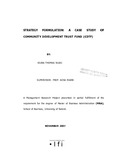| dc.contributor.author | Kiuna, Thomas N | |
| dc.date.accessioned | 2013-05-10T09:23:21Z | |
| dc.date.available | 2013-05-10T09:23:21Z | |
| dc.date.issued | 2007 | |
| dc.identifier.citation | Masters of business administration | en |
| dc.identifier.uri | http://erepository.uonbi.ac.ke:8080/xmlui/handle/123456789/21209 | |
| dc.description.abstract | Strategy formulation is the development of long-term plans for the effective
management of environmental opportunities and threats in light of the
organization's strengths and weaknesses.To achieve an effective strategic fit with
the environment, strategies should be formulated in a partnership manner that
involves consultation and participation. Strategy formulation is thus a social and
political process in which interest groups with often-conflicting interests and
bargaining powers interact. The process should involve key stakeholders who
influence and share control over the organization's resources. The entire strategy
formulation process must have the blessing and active participation of top
management and senior managers should playa leading role in the exercise.
Strategy formulation is part of the wider strategic planning process.
The study focused on strategy form\Jlation process using a case study of -. Community Development Trust Fund (CDTF). Chapter one has reviewed the
challenges Kenya faces in implementation of development programmes in
conjunction with major donors. The specific objectives of the study were to
establish the various challenges that CDTF has faced in its attempts to formulate
effective strategies to meet its mission and to also document the strategy
formulation processat CDTF.
(v)
The literature review has focused on the concept of strategy and its importance in
the organisation. The section has also presented an evolution of strategic
management and description of the strategic planning process. Various
approaches to strategic planning, its value and challenges have also been
documented. The methodology applied in the study has been presented in
chapter three. Qualitative primary data was collected by conducting interviews
with 6 senior officials of CDTF.
The findings of the study reveal that the strategies adopted were all geared
towards the mission and vision, and that there is a direct relationship between the
organization's mission statement and the strategies adopted. The major
challenges faced by CDTF in formulating its strategies were found to include weak
governance and management systems in the public sector, corruption, inherent
weaknesses of the Ministry of Planning, slow disbursements and bureaucracy by
the European Union (EU). The seconded technicat-advisors from the EU were also
reported to have limited expert knowledge and experience than the CDTF officials.
The study recommends that strategy formulation should precede strategy
implementation at CDTF, and there should also be sufficient, timely and flexible
allocation of resources to finance the programmes. | en |
| dc.description.sponsorship | University of Nairobi | en |
| dc.language.iso | en | en |
| dc.title | Strategy formulation: a case study of community development trust fund (CDTF) | en |
| dc.type | Thesis | en |
| local.publisher | School of business,University of Nairobi | en |

